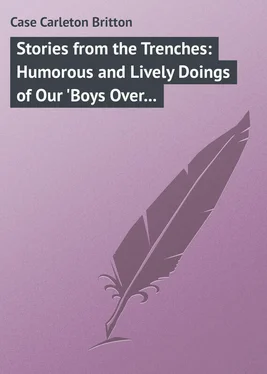Carleton Case - Stories from the Trenches - Humorous and Lively Doings of Our 'Boys Over There'
Здесь есть возможность читать онлайн «Carleton Case - Stories from the Trenches - Humorous and Lively Doings of Our 'Boys Over There'» — ознакомительный отрывок электронной книги совершенно бесплатно, а после прочтения отрывка купить полную версию. В некоторых случаях можно слушать аудио, скачать через торрент в формате fb2 и присутствует краткое содержание. ISBN: , Издательство: Иностранный паблик, Жанр: foreign_prose, foreign_humor, Анекдоты, на английском языке. Описание произведения, (предисловие) а так же отзывы посетителей доступны на портале библиотеки ЛибКат.
- Название:Stories from the Trenches: Humorous and Lively Doings of Our 'Boys Over There'
- Автор:
- Издательство:Иностранный паблик
- Жанр:
- Год:неизвестен
- ISBN:http://www.gutenberg.org/ebooks/49653
- Рейтинг книги:3 / 5. Голосов: 1
-
Избранное:Добавить в избранное
- Отзывы:
-
Ваша оценка:
- 60
- 1
- 2
- 3
- 4
- 5
Stories from the Trenches: Humorous and Lively Doings of Our 'Boys Over There': краткое содержание, описание и аннотация
Предлагаем к чтению аннотацию, описание, краткое содержание или предисловие (зависит от того, что написал сам автор книги «Stories from the Trenches: Humorous and Lively Doings of Our 'Boys Over There'»). Если вы не нашли необходимую информацию о книге — напишите в комментариях, мы постараемся отыскать её.
Stories from the Trenches: Humorous and Lively Doings of Our 'Boys Over There' — читать онлайн ознакомительный отрывок
Ниже представлен текст книги, разбитый по страницам. Система сохранения места последней прочитанной страницы, позволяет с удобством читать онлайн бесплатно книгу «Stories from the Trenches: Humorous and Lively Doings of Our 'Boys Over There'», без необходимости каждый раз заново искать на чём Вы остановились. Поставьте закладку, и сможете в любой момент перейти на страницу, на которой закончили чтение.
Интервал:
Закладка:
Carleton B. Case
Stories from the Trenches: Humorous and Lively Doings of Our 'Boys Over There'
THE MAN WHO “CAME BACK”
ONE of the strangest of the many personal romances which the war has brought is the tale of a man who, dismissed from the British Army by court martial, redeemed himself through service with that most heterogeneous of organizations, the French Foreign Legion. His name was John F. Elkington, and he had held an honored post for more than thirty years. Then, just as his regiment, in the closing months of 1914, was going into the fighting on the Western front, he was cashiered for an unrevealed error and deprived of the opportunity to serve his country.
Heavy with disgrace, he disappeared, and for a long time no one knew what had become of him. Some even went so far as to surmise that he had committed suicide, until finally he turned up as an enlisted soldier in the Foreign Legion. In their ranks he went into the conflict to redeem himself. Today, says the New York Herald , he is back in England. He will never fight again, for he has practically lost the use of his knees from wounds. But he is perhaps the happiest man in England, and the account tells why, explaining:
Pinned on his breast are two of the coveted honors of France – the Military Medal and the Military Cross – but most valued possession of all is a bit of paper which obliterates the errors of the past – a proclamation from the official London Gazette announcing that the King has “graciously approved the reinstatement of John Ford Elkington in the rank of lieutenant-colonel, with his previous seniority, in consequence of his gallant conduct while serving in the ranks of the Foreign Legion of the French Army.”
Not only has Colonel Elkington been restored to the Army, but he has been reappointed in his old regiment, the Royal Warwickshires, in which his father served before him.
In the same London Gazette , at the end of October, 1914, had appeared the crushing announcement that Elkington had been cashiered by sentence of general court martial. What his error was did not appear at the time, and has not been alluded to in his returned hour of honor. It was a court martial at the front at a time when the first rush of war was engulfing Europe and little time could be wasted upon an incident of that sort. The charge, it is now stated, did not reflect in any way upon the officer’s personal courage.
But with fallen fortunes he passed quietly out of the Army and enlisted in the Legion – that corps where thousands of brave but broken men have found a shelter, and now and then an opportunity to make themselves whole again.
Colonel Elkington did not pass unscathed through fire. His fighting days are ended. His knees are shattered and he walks heavily upon two sticks.
“They are just fragments from France,” he said of those wounded knees, and smiled in happy reminiscence of all they meant.
“It is wonderful to feel,” said Colonel Elkington, “that once again I have the confidence of my King and my country. I am afraid my career in the field is ended, but I must not complain.”
Colonel Elkington made no attempt to cloak his name or his former Army service when he entered the ranks of the Legion.
“Why shouldn’t I be a private?” he asked. “It is an honor for any man to serve in the ranks of that famous corps. Like many of the other boys, I had a debt to pay. Now it is paid.”
The press of London is unanimous in welcoming the old soldier back into his former rank. One of them, The Evening Standard , contains the account of how he went about enlisting for France when he saw he would best leave London. It is written by a personal friend of Colonel Elkington, with all the vividness and sympathy of an actual observer of the incidents detailed. We are told:
“Late in October, 1914, I met him, his Army career apparently ruined. He had told the truth, which told against him; but in the moment when many men would have sunk, broken and despairing, he bore himself as he was and as he is today, a very gallant gentleman. He had been cashiered and dismissed from the service for conduct which, in the judgment of the court martial, rendered him unfit and incapable of serving his sovereign in the future in any military capacity. The London Gazette came out on October 14, 1914, recording the fact, and it became known to his many friends. For over thirty years he had served, and for distinguished service wore the Queen’s medal with four clasps after the Boer War. He went to France with the Royal Warwickshire Regiment at the outbreak of this conflict. His chance had come after twenty-eight years.”
During the first terrible two months he had done splendid work. A moment sufficient to try the discretion of any officer arrived. He made his mistake. He told his story to the general court martial. He vanished – home; and the London Gazette had the following War-Office announcement:
“Royal Warwickshire Regiment. – Lieutenant-Colonel John F. Elkington is cashiered by sentence of a general court martial. Dated September 14, 1914.”
He recognized at once, as he sat with me, what this meant. We chatted about various projects, and at last he said, “There is still the Foreign Legion. What do you say?”
Being acquainted with it, I told him what I knew; how it was the “refuge” for men of broken reputations; how it contained Italians, Germans, Englishmen, Russians, and others who had broken or shattered careers; the way to set about joining it by going to the recruiting office at – ; how the only requirement was physical fitness; that no questions would be asked; that I doubted if he would like all his comrades; that the discipline was very severe; that he might be sent to Algiers; that he would find all kinds of men in this flotsam – men of education and culture, perhaps scoundrels and blackguards as well; but he would soon discover perfect discipline.
Now for a man of his age to smile as he did, to set out on the bottom rung of the ladder as a ranker in a strange army, among strangers, leaving all behind him that he held dear, was a great act of moral courage. We heard of him at intervals, but such messages as dribbled through to his friends were laconic. We heard also he had been at this place and that, and that he was well and apparently doing well. That he had been repeatedly in serious action of recent months we also knew, and then came the news that he had won the coveted Médaillé Militaire – and more, that it was for gallant service. A curious distinction it is in some ways. Any meritorious service may win it; but not all ranks can get it. A generalissimo like General Joffre or Sir Douglas Haig may wear it for high strategy and tactics, and a non-commissioned officer or private may win and wear it for gallantry or other distinction. But no officer below a generalissimo can gain it. This distinction Elkington won. We all felt he had made good in the Legion, where death is near at all times, and we waited.
Today’s Gazette announcement has given all who knew him the greatest pleasure. He has told none of them for what particular act he received the coveted medal – just like Jack Elkington’s modesty.
But, as soon as he arrived home in England, the interviewers went after him hot and heavy. He found it all very boresome, for, now that the affair was over, he could see no use in talking about it to everybody. A reporter for The Daily Chronicle , however, managed to get what is probably the most satisfactory interview with him and one which shows to best advantage the peculiar psychology of this man who has experienced so many different sides of life. The interviewer, in telling of their conversation, portrays the Colonel as saying:
Читать дальшеИнтервал:
Закладка:
Похожие книги на «Stories from the Trenches: Humorous and Lively Doings of Our 'Boys Over There'»
Представляем Вашему вниманию похожие книги на «Stories from the Trenches: Humorous and Lively Doings of Our 'Boys Over There'» списком для выбора. Мы отобрали схожую по названию и смыслу литературу в надежде предоставить читателям больше вариантов отыскать новые, интересные, ещё непрочитанные произведения.
Обсуждение, отзывы о книге «Stories from the Trenches: Humorous and Lively Doings of Our 'Boys Over There'» и просто собственные мнения читателей. Оставьте ваши комментарии, напишите, что Вы думаете о произведении, его смысле или главных героях. Укажите что конкретно понравилось, а что нет, и почему Вы так считаете.












